

A Map Of How Emotions Influence Our Lives, Commissioned By The Dalai Lama. The five circles slowly pulsing on my screen are meant to visualize the entire core of human emotion.
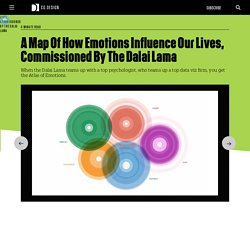
Fear. Disgust. Anger. Sadness. A Brand New 'Atlas' Shows Where Different Ideas Live in Our Brains. A man on the radio is talking about what it was like to come out to his family as gay.

The sound of his voice streams into the ear of the listener and vibrates in the snail shell-shaped cavity of her cochlea. The sounds are translated into electric impulses, which shoot along her nerves into her auditory cortex. Language processing centers start parsing the story for syllables, words, rhythm and syntax. Testing for Joy and Grit? Schools Nationwide Push to Measure Students’ Emotional Skills.
Argument still rages about whether schools can or should emphasize these skills.
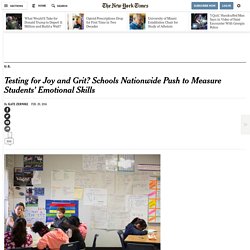
Critics say the approach risks blaming the victim — if only students had more resilience, they could rise above generational poverty and neglected schools — and excuses uninspired teaching by telling students it is on them to develop “zest,” or enthusiasm. Groups that spent decades urging the country toward higher academic standards worry about returning to empty talk of self-esteem, accepting low achievement as long as students feel good. But teaching social-emotional skills is often seen as a way to move away from a narrow focus on test scores, and to consider instead the whole child. When did the self-help movement lose its ethical seriousness? Albert Camus on strength of character, a beautiful animated short film inspired by Oliver Sacks, David Foster Wallace on writing, and more. Communities of Character. We live in an individualistic age.
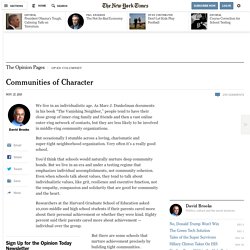
As Marc J. Dunkelman documents in his book “The Vanishing Neighbor,” people tend to have their close group of inner-ring family and friends and then a vast online outer-ring network of contacts, but they are less likely to be involved in middle-ring community organizations. Choose to Be Grateful. It Will Make You Happier. Photo TWENTY-FOUR years ago this month, my wife and I married in Barcelona, Spain.
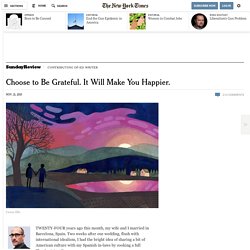
Two weeks after our wedding, flush with international idealism, I had the bright idea of sharing a bit of American culture with my Spanish in-laws by cooking a full Thanksgiving dinner. Easier said than done. The Science of Happiness: Why complaining is literally killing you. (New Video — A Casual Overview for those who’d like the less wordy version.)
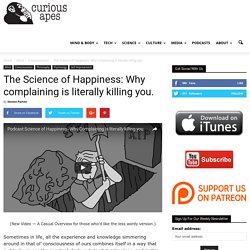
Teaching Peace in Elementary School. Photo FOR years, there has been a steady stream of headlines about the soaring mental health needs of college students and their struggles with anxiety and lack of resilience.
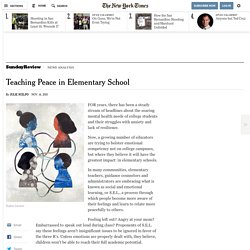
Now, a growing number of educators are trying to bolster emotional competency not on college campuses, but where they believe it will have the greatest impact: in elementary schools. In many communities, elementary teachers, guidance counselors and administrators are embracing what is known as social and emotional learning, or S.E.L., a process through which people become more aware of their feelings and learn to relate more peacefully to others. Feeling left out? Positivity: 11 Steps To Grow Your Happiness. CCR publishes its Character framework: complete, concise, clear, actionable, globally relevant. How Women Can Gain Confidence at Work (and Elsewhere) - Fortune. How Children's Social Competence Impacts Their Well-Being in Adulthood. Overview A 20-year retrospective study, funded by the Robert Wood Johnson Foundation and published in the July 2015 issue of the American Journal of Public Health, suggests that kindergarten students who are more inclined to exhibit “social competence” traits—such sharing, cooperating, or helping other kids—may be more likely to attain higher education and well-paying jobs.
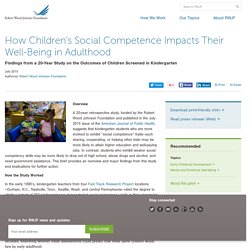
In contrast, students who exhibit weaker social competency skills may be more likely to drop out of high school, abuse drugs and alcohol, and need government assistance. This brief provides an overview and major findings from this study and implications for further action. How the Study Worked In the early 1990’s, kindergarten teachers from four Fast Track Research Project locations—Durham, N.C., Nashville, Tenn., Seattle, Wash. and central Pennsylvania—rated the degree to which a cohort of 753 kindergarteners demonstrated social competence skills in their classroom interactions using an eight-point scale. Key Findings. Executive Functions (2013) Self-regulation and school success (2013) Happiness Inc. (2013) According to Sonja Lyubomirsky, you have a happiness set point.

It’s partly encoded in your genes. If something good happens, your sense of happiness rises; if something bad happens, it falls. But either way, before too long, your mood will creep back to its set point because of a really powerful and perverse phenomenon referred to in science as “hedonic adaptation.” You know, people get used to things. To see the full article, subscribe here. Correction: April 19, 2013. Activities and programs that improve children’s executive functions (2012) Who does well in life? Conscientious adults excel in both objective and subjective success (2012) Post-Traumatic Stress’s Surprisingly Positive Flip Side (2012) What If the Secret to Success Is Failure? (2011) Over the course of the next year and a half, Duckworth worked with Levin and Randolph to turn the list of seven strengths into a two-page evaluation, a questionnaire that could be completed by teachers or parents, or by students themselves.
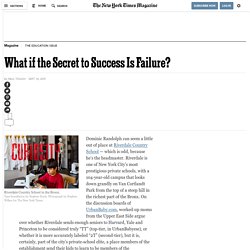
For each strength, teachers suggested a variety of “indicators,” much like the questions Duckworth asked people to respond to on her grit questionnaire, and she road-tested several dozen of them at Riverdale and KIPP. She eventually settled on the 24 most statistically reliable ones, from “This student is eager to explore new things” (an indicator of curiosity) to “This student believes that effort will improve his or her future” (optimism). For Levin, the next step was clear. Wouldn’t it be cool, he mused, if each student graduated from school with not only a G.P.A. but also a C.P.A., for character-point average? Photo. Interventions Shown to Aid Executive Function Development in Children 4-12 Years Old (2011) A New Gauge to See What’s Beyond Happiness (2011) The evidence base for improving school outcomes by addressing the whole child and by addressing skills and attitudes, not just content (2010)
Deliberate practice spells success: Why grittier competitors triumph at the National Spelling Bee (2010) Can the Right Kinds of Play Teach Self-Control? (2009) The economics and psychology of personality traits (2008) Preschool program improves cognitive control (2007) Happiness 101 (2007) Grit: Perseverance and passion for long-term goals (2007)
Self-discipline outdoes IQ in predicting academic performance of adolescents (2006) Research-Based Character Education (2004) Strengths of character and well-being (2004) Tiffany Shlain Receives Support From The Bezos Family Foundation For Her “Science of Character” Ms. Shlain produced the short film to mark the first annual worldwide ‘Character Day’ on Thursday March 20th 2014. Prize winning filmmaker Tiffany Shlain producer of the ‘Let it Ripple: Mobile Films for Global Change’ series, has reportedly been the recipient of moral as well as financial support from the Bezos Family Foundation on the release of her latest short film entitled ‘The Science of Character.’